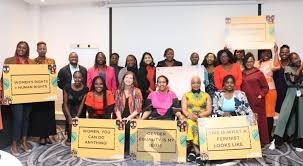The 16 Days of Activism Against Gender-Based Violence
The 16 Days of Activism Against Gender-Based Violence (GBV) is a global initiative aimed at eradicating violence against women and girls. This annual campaign runs from November 25 to December 10 and focuses on the devastating effects of gender-based violence.
The World Health Organization (WHO) highlights that 2023 marked a pivotal shift in the narrative surrounding this campaign. The emphasis is clear: ending violence against women is not only a moral obligation but also a vital necessity for our global community.
This Year’s Campaign Theme
The theme for this year’s campaign, “Ending violence against women is possible, but only if we act together, now,” reinforces the urgent call for collective action in tackling the pervasive issue of GBV. Originally launched by the Centre for Women’s Global Leadership in the 1990s, this initiative has evolved into a globally recognized movement known as the Global 16 Days Campaign, drawing attention to the need for action against violence faced by women and girls everywhere.
The Scope and Urgency of the Issue
According to the WHO, violence against women is a widespread issue that transcends cultural and national boundaries, leading to significant physical, psychological, and societal repercussions. The situation worsens for women and girls in humanitarian crises, where risks to their well-being are elevated.
Structural inequalities often perpetuate this violence, with emergencies such as conflicts, natural disasters, and health crises exacerbating risks. In such contexts, women and girls face increased threats and limited access to essential care services, underscoring the necessity for urgent action concerning GBV amid crises.
The ramifications of GBV are profound, with survivors commonly experiencing physical injuries, unintended pregnancies, sexually transmitted infections, depression, and post-traumatic stress disorder. Despite these severe effects, many survivors encounter significant barriers in accessing the care they desperately need.
The Role of Health Systems and Humanitarian Action
Health professionals often serve as the first point of contact for survivors, making it essential to provide safe, timely, and confidential services, including medical treatment and psychological support. Addressing GBV within humanitarian settings remains a critical focus of this campaign, as such environments often see a spike in violence, necessitating robust responses from health and social services.
The WHO has taken significant steps to ensure that healthcare providers are trained and equipped to support survivors in high-risk environments. This year’s campaign reiterates that GBV is not merely a women’s issue; it is fundamentally a human rights issue that requires broad-based action and commitment across all sectors.
Shifting Perspectives and Engaging the Community
In Kenya, the 16 Days of Activism have sparked vital conversations, encouraging involvement from individuals across various demographics, irrespective of gender. Civil society organizations, media outlets, governmental bodies, and corporations have collectively recognized the importance of addressing GBV, as highlighted by Tatyana Kendi of the Kenya Human Rights Commission (KHRC). She noted, “It has been radically effective. We have seen recognition from all sectors in the country, including organizations such as the National Land Commission and the National Gender Equality Commission. Even corporate entities are shedding light on issues surrounding GBV.”
This shift signifies a breaking down of the silence surrounding GBV, with community members acknowledging that it is a human rights issue that affects all of society. Young boys and men are being engaged to foster awareness and empathy concerning GBV, helping to dismantle harmful societal norms around violence.
Promoting Access to Justice
The KHRC is also advocating for improved access to justice for survivors. Collaborating with the UN Development Programme (UNDP), KHRC has been actively involved in projects designed to provide survivors with the necessary legal and psychosocial support. This innovative initiative has already seen successful outcomes over the past two years, with survivors receiving vital assistance in their recovery journeys.
Looking Ahead: Beyond the 16 Days
The 16 Days of Activism serves as a powerful reminder for governments, organizations, and individuals alike to come together in the fight against gender-based violence. The messages resonating from this campaign are clear: ending violence against women and girls is crucial for building a safer and more equitable society. The responsibility lies with all of us to act now to forge a future free from violence.
“Ending violence against women and girls is not only possible; it is essential for creating a world where everyone can live with dignity and respect,” Kendi emphasized. “This global campaign shows us that united, we can build a future where gender-based violence no longer holds power.”


